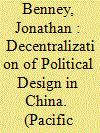| Srl | Item |
| 1 |
ID:
175591


|
|
|
|
|
| Summary/Abstract |
Political posters, banners, and similar objects are extremely common in China. This article uses political design from contemporary China, particularly emphasising the government’s Chinese Dream campaign, to analyze what at first appears to be a paradox. The subjects of the campaigns and the language they use are mandated by the central government and promoted through central and local publicity departments. But the graphic aspects of these campaigns, such as the choice of colours, images, layout, and typeface, are much less strictly controlled, and are decided by local governments or authorities. This makes political design in China decentralized. Decentralized design is inconsistent with the principles of global marketing and with the PRC’s reliance on set forms of political discourse, both of which rely on the assumption that uniformity will lead to more effective communication of messages and persuasion of the public. Evidence from local design campaigns indeed shows that Chinese political posters are often designed hastily and without expertise, resulting in strange and unpersuasive images. Despite this, this article shows that decentralized design is not paradoxical. This is largely because the Chinese party-state uses propaganda as a method of “signalling” its overall power, more than as a tool of indoctrination or persuasion about particular topics. The central government’s reliance on incentives and metrics to regulate local authorities also means that the production of propaganda is also a means by which local governments can signal their loyalty to the Centre.
|
|
|
|
|
|
|
|
|
|
|
|
|
|
|
|
| 2 |
ID:
144569


|
|
|
|
|
| Summary/Abstract |
This article assesses stability maintenance (weiwen) as a means of conflict resolution in China. It argues that the resolution of local disputes in China, particularly outside cities, is now being influenced and facilitated by the discourse and practice of stability maintenance, rather than legal methods and traditional mediation processes. This conclusion adds to the existing academic views of stability maintenance, which have previously emphasized social control to the exclusion of almost all else, and suggests that stability maintenance-focused conflict resolution may have practical benefits to Chinese citizens, given the state’s withdrawal from legal conflict resolution methods and its ambiguous attitude towards mediation.
|
|
|
|
|
|
|
|
|
|
|
|
|
|
|
|